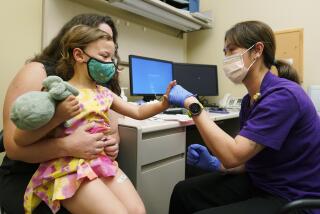Talking to children about their mortality
No situation is more difficult for a family than the terminal illness of a child. Although there is a trend among doctors and nurses to encourage discussions about death, there has been little research on the outcomes of such difficult talks.
Now researchers have found that parents who broached the subject of death with a child dying of cancer had no regrets about their choice, while some who hid the truth were sorry for not having the discussion.
Ulrika Kreicbergs, a nurse at the Karolinska Institute in Stockholm, knew going into her study that parents are torn about discussing death, even when the child intuitively knows death is imminent.
Smaller studies, she reports in the Sept. 16 issue of the New England Journal of Medicine, suggested children appreciate honesty.
In her research, the largest such study ever, she found that openness lifts a burden for everyone.
Kreicbergs combed through Sweden’s extensive vital records and tried to contact every parent who lost a child to cancer between 1992 and 1997. Among 561 eligible parents, 429 answered an extensive questionnaire. A key survey question: Did you talk about death with your child at any time?
Of the 429 parents who answered, one-third said they did. Among those, none regretted it. For those who remained mum, more than a quarter in retrospect said they wished they had spoken up.
“This study is not dogmatic. It does not say you must tell all dying children about their death,” said Dr. Lawrence Wolfe, chief of pediatric hematology and oncology at the Floating Hospital for Children at Tufts-New England Medical Center in Boston. “This information is a legacy from people who are opening their hearts to other parents who may now be in this situation.” Wolfe, who wrote a critique in the journal, said in a phone interview that the results also give doctors and nurses a sharper perspective. Now they can tell parents who are struggling that parents who talked about death had no regrets.
“It’s just impossible to lose a child and not suffer,” Wolfe said. “But you would like that suffering to be about the loss of the child and not about if only I had said this or if only I had done that.
“Talking about death doesn’t make the death of a child any easier to bear, but what comes out of it sometimes can be enlightening.”
In his critique, Wolfe shared his experiences as a physician who has dealt with the deaths of young patients.
“I have seen children with cancer respond to the idea of their dying with startling maturity -- a 9-year-old boy left a legacy by giving his prized possessions to his friends, planned his funeral and decided what he would wear to his burial. And I have seen a dysfunctional family filled with anger come together in a hospital room, acknowledging to me that their experience completely changed how they viewed the world and one another,” Wolfe wrote.
Betty Ferrell, a research scientist and nurse at the City of Hope National Medical Center in Duarte and a leader in a national training program aimed at improving end-of-life care for children, said the Swedish research was long-awaited.
“I think it would be wonderful to replicate this kind of study here in the United States,” Ferrell said.
Experts say there is no recipe for broaching the subject. Ferrell said situations differ and the age of a child determines what is said and when.






